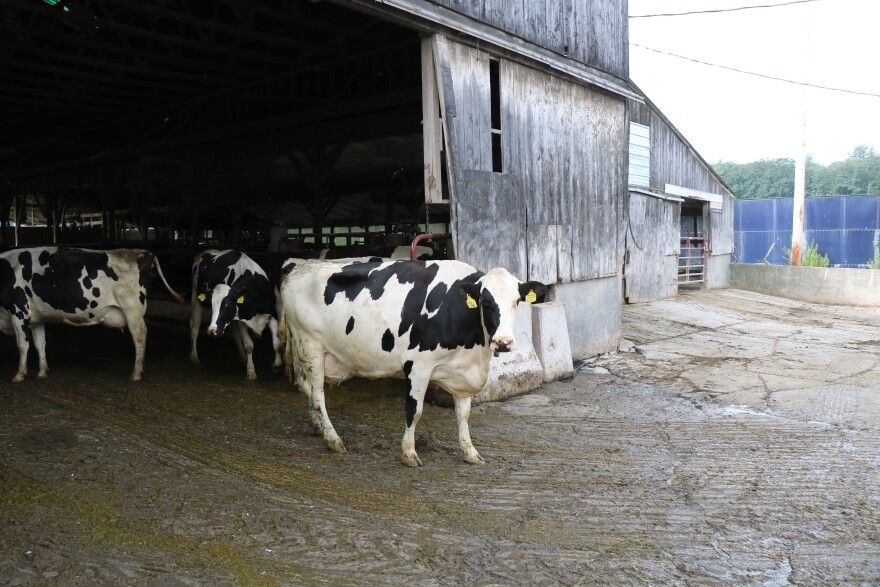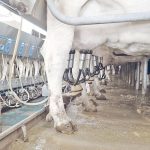
Now is a critical moment to invest in Vermont’s organic dairy farms, and our public institutions have a role to play. Vermont’s K-12 schools alone buy over 700,000 gallons (5.6 million pounds) of fluid milk annually, plus all the yogurt and cheese they purchase beyond that.
Vermont has historically been ahead of its time in regard to agriculture, and the crisis we face now with the impending loss of Horizon Organic’s dairy contracts presents an opportunity to set an example again.
Vermont Sen. Patrick Leahy presciently backed the founding of the National Organic Program and helped make organic farming a national conversation. He also championed the national Farm to School program that was modeled after Vermont’s first-in-the-nation Farm to School grant program to support schools in forging strong connections with local producers, both in the cafeteria and the classroom.
And just this year, the Vermont Legislature passed a bill (now Act 67) that creates a new local food purchasing incentive for schools. This program provides additional reimbursement to schools that demonstrate they are buying at least 15% of food locally for their meal programs.
This is a win-win-win program: For farmers, it generates economic viability by building new markets for their products; for the environment, it helps shorten supply chains, travel time, and the overall carbon cost of getting food onto plates; and for Vermont’s children, it increases the nutritional quality of their school meals. And, on top of all that, a UVM study has shown that for every $1 schools spend on local food, an additional 60 cents circulates in the local economy. This program provides a template we need for our communities to thrive.
Can we take this momentum further and invest in the systems that will allow our public schools to support more Vermont organic farmers while simultaneously nourishing our schoolchildren with high-quality local organic milk?
One key investment could be to add or expand processing facilities that could produce a reliable supply of organic dairy products with the specifications that schools (and other institutions) need, such as kid-friendly 8-ounce milk cartons, 5-gallon bulk milk containers for cafeteria dispensers, bulk yogurt in 17.5-pound tubs, and shredded mozzarella.
Let’s leverage the local food purchasing incentive program to identify and support a price point for these products that works for both schools and producers.
Vermonters are known for our creativity and ingenuity in the face of adversity. Furthermore, we strongly value our working landscape and the many benefits that organic farmers provide through their stewardship of the land. The small-scale farms that dot Vermont’s landscape, particularly those tending land organically, keep our land ecologically healthy and our people nourished.
Organic management has also helped many small and medium-sized farms to stay in business, giving them the competitive advantage they need in the face of corporate consolidation throughout the food system. Organic dairy farms in Vermont manage 60,500 acres of hay, pasture and crops, representing an enormous percentage of the land tended organically in the state. We cannot afford to lose these organic farms whose care and efforts sequester carbon, clean water, and create biodiverse habitats.
In this moment of corporate consolidation, we can again be ahead of our time and invest in organic dairy for schools and other public institutions.
As Horizon Organic abandons small dairy farms across the Northeast, Vermont has the opportunity to ensure that our dairy farmers can keep farming organically and that our schoolchildren can have access to Vermont’s excellent organic milk. While some very real challenges exist around pricing, processing, marketing and distribution, it is possible for our schools to play an important role if we have the will to invest.
This must not be viewed as a singular solution, but rather as part of a diversified strategy that will contribute significantly to our state’s long-term resilience.
Let’s pivot from a moment that might seriously hurt Vermont’s farm viability to one that can help us enormously, setting a high bar for the rest of the nation. Let’s imagine a solution in which Vermont’s schoolchildren have access to the best quality products and our farms have access to viable markets. Can we lead the nation again?
Let’s act boldly and help Vermont usher in a new way to support our local economy and lands through public investment in what makes our state so very special. After all, the very roots of the national Farm to School movement can be traced back to many of our village schools and small family farms that have always known that there is a better way to feed our kids: the Vermont way.

























